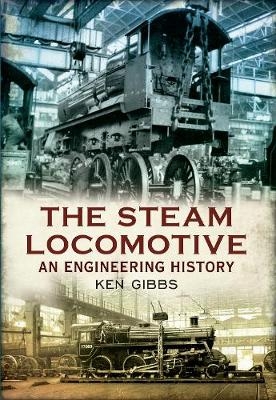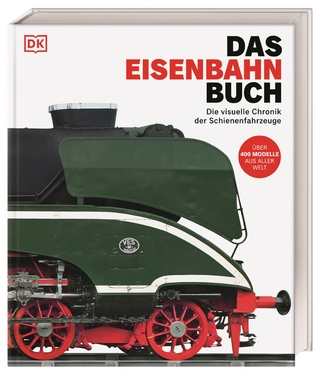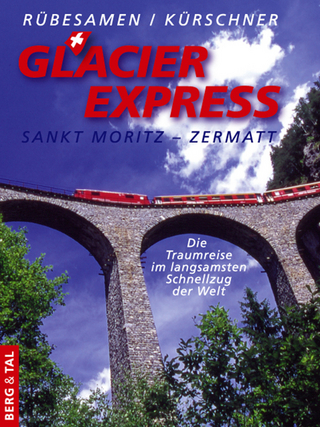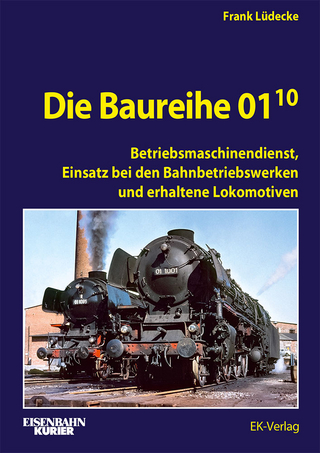
The Steam Locomotive
An Engineering History
Seiten
2012
Amberley Publishing (Verlag)
978-1-4456-0918-8 (ISBN)
Amberley Publishing (Verlag)
978-1-4456-0918-8 (ISBN)
Ken Gibbs tells the history of the engineering triumph that is a steam locomotive from the 1800s to the 1960s showing how each development changed the course of history.
Books on railway history invariably start with the Stephenson's or with Richard Trevithick's locomotive of 1804., but the story begins much earlier with the development of steam engines for pumping out deep mines. Ken Gibbs, a retired engineer who served his apprenticeship in the Swindon Works of British Railways, takes a more practical approach to railway history, using its engineering developments to tell the story of the railways. From the first ideas to the development of better metals, manufacturing, technology in wheel casting, improved boilers and valve gears, his book is a refreshingly different approach to the plethora of picture books showing branch lines in days past. Ken's engineering background and love of railway technology gives us a book suited to the layman and engineer alike, explaining how each development made the railways better, faster or safer. It took over 150 years to develop the steam locomotive from a basic boiler on wheels weighing a couple of tons to the magnificent express passenger and freight locomotives weighing in excess of 100 tons and capable of speeds over 120mph.
Read how the steam locomotive developed from those early days to the last days of steam.
Books on railway history invariably start with the Stephenson's or with Richard Trevithick's locomotive of 1804., but the story begins much earlier with the development of steam engines for pumping out deep mines. Ken Gibbs, a retired engineer who served his apprenticeship in the Swindon Works of British Railways, takes a more practical approach to railway history, using its engineering developments to tell the story of the railways. From the first ideas to the development of better metals, manufacturing, technology in wheel casting, improved boilers and valve gears, his book is a refreshingly different approach to the plethora of picture books showing branch lines in days past. Ken's engineering background and love of railway technology gives us a book suited to the layman and engineer alike, explaining how each development made the railways better, faster or safer. It took over 150 years to develop the steam locomotive from a basic boiler on wheels weighing a couple of tons to the magnificent express passenger and freight locomotives weighing in excess of 100 tons and capable of speeds over 120mph.
Read how the steam locomotive developed from those early days to the last days of steam.
Ken Gibbs' family has long had an association with the Great Western. He started his apprenticeship at Swindon Works in 1944, the story of which is recorded in this book. Ken still lives in Swindon.
| Erscheint lt. Verlag | 15.12.2012 |
|---|---|
| Zusatzinfo | 307 Illustrations |
| Verlagsort | Chalford |
| Sprache | englisch |
| Maße | 172 x 248 mm |
| Gewicht | 653 g |
| Themenwelt | Natur / Technik ► Fahrzeuge / Flugzeuge / Schiffe ► Schienenfahrzeuge |
| ISBN-10 | 1-4456-0918-5 / 1445609185 |
| ISBN-13 | 978-1-4456-0918-8 / 9781445609188 |
| Zustand | Neuware |
| Haben Sie eine Frage zum Produkt? |
Mehr entdecken
aus dem Bereich
aus dem Bereich
die visuelle Chronik der Schienenfahrzeuge
Buch | Hardcover (2024)
DK Verlag Dorling Kindersley
34,95 €
St. Moritz – Zermatt : die Traumreise im langsamsten Schnellzug der …
Buch | Hardcover (2023)
Verlag Berg & Tal
14,95 €
Betriebsmaschinendienst, Einsatz bei den Bahnbetriebswerken und …
Buch | Hardcover (2024)
EK-Verlag
54,00 €


